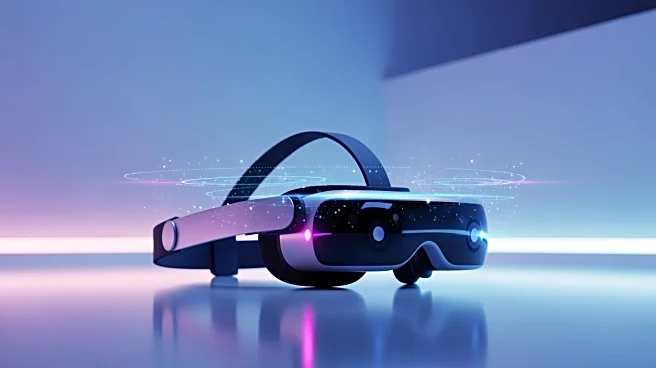What's Happening?
Meta's Chief Technology Officer, Andrew Bosworth, has declared 2025 as a pivotal year for the augmented reality (AR) industry during a Bloomberg Tech interview. This statement has sparked significant attention and debate within the tech community, particularly
concerning the future of AR hardware. Bosworth highlighted the sale of 2 million smart glasses and the growing competition from major players like Google and Samsung. His remarks have reframed industry expectations, emphasizing the importance of distinguishing between genuine market momentum and mere hype. Meta has issued an ambitious roadmap for 2025, prompting competitors to accelerate their product timelines. Analysts have identified adoption rates as a critical factor, with retail availability and pricing strategies being key to success.
Why It's Important?
The declaration by Bosworth underscores the critical juncture at which the AR industry finds itself. The potential for rapid consumer uptake and the competitive pressure from other tech giants could significantly impact supply chains, retail strategies, and investment decisions. The industry is poised for substantial growth, with headset shipments estimated to reach 7.7 million units in 2025. However, the wide price range of $300-$1,500 for AR devices presents both opportunities and challenges for mass-market adoption. The split in reactions—optimism from some executives and caution from others—highlights the tension between innovation and consumer trust. The decisions made by manufacturers and retailers in response to this pivotal year will shape the industry's trajectory.
What's Next?
As the industry navigates this pivotal year, manufacturers face the choice between prioritizing product polish or increasing production volume. Retailers are expected to hedge their inventory strategies, testing pricing models and exploring subscription trials. New partnerships may emerge as companies seek to capitalize on the growing interest in AR technology. The next 12 months will be crucial in determining whether consumers will embrace these advancements, influencing hiring practices, partnership opportunities, and retail campaigns. The industry's ability to balance rapid innovation with consumer satisfaction will be key to its success.
Beyond the Headlines
The declaration by Bosworth not only impacts immediate industry strategies but also raises broader questions about the ethical and cultural implications of augmented reality. As AR technology becomes more integrated into daily life, issues such as privacy, data security, and the digital divide may become more pronounced. The industry's focus on hardware and ecosystem investments could lead to long-term shifts in how technology is developed and consumed, potentially redefining user experiences and societal norms.
















